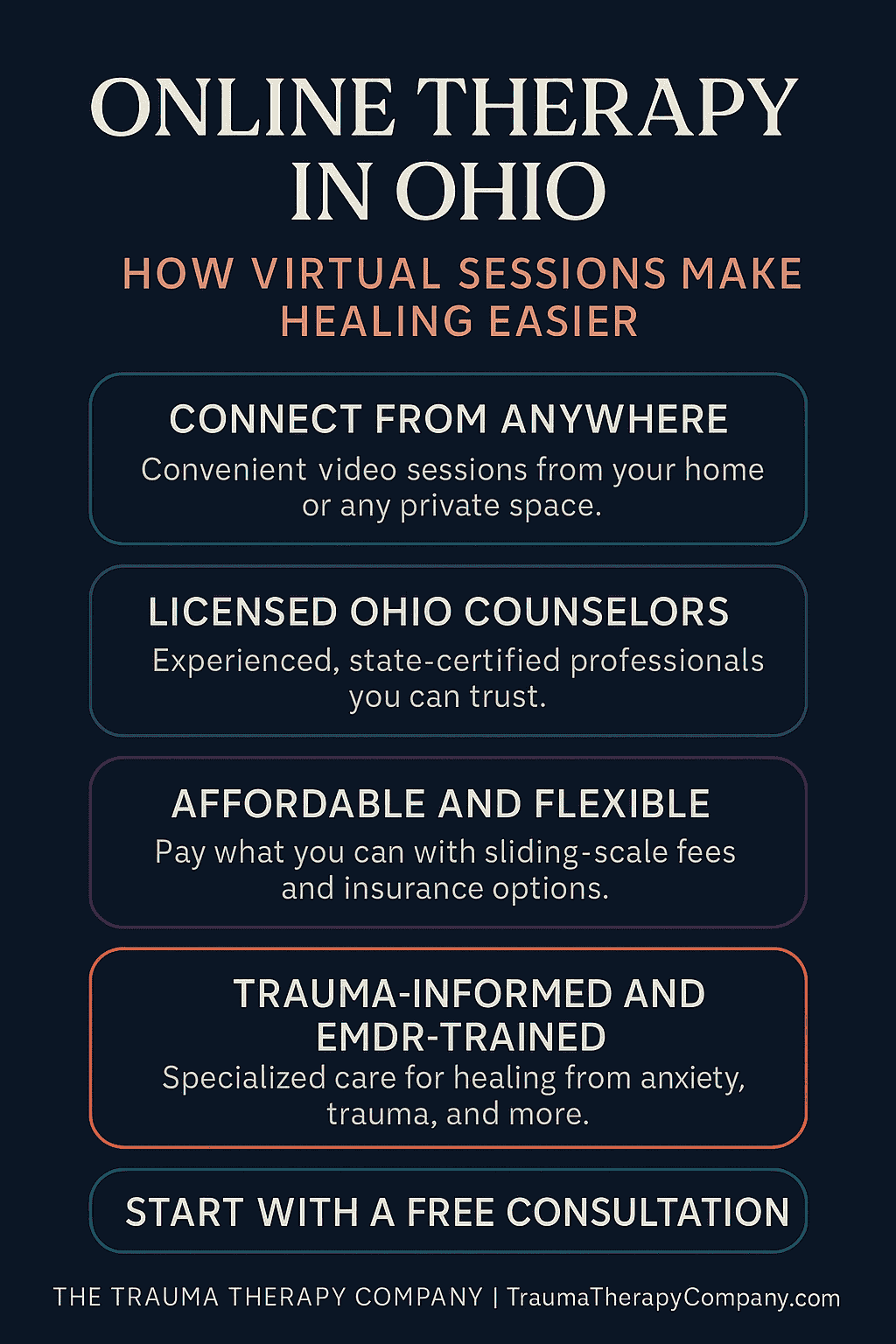
Parenting Teens in the Digital Age: Tips from Ohio Therapists Who Get It
How to stay connected when technology takes over.
Your teen walks in from school, drops their backpack, and immediately grabs their phone. You ask about their day — “Fine.” You try again — “What did you do in band today?” “Nothing.” The conversation ends before it starts, and within seconds, they’re scrolling, texting, or gaming.
Sound familiar?
As family and trauma therapists in Ohio, we hear this story almost daily. Parents are desperate to connect with their kids, but they feel like they’re competing with a screen. Teens, on the other hand, often feel overwhelmed by constant digital pressure — social comparison, group chats, notifications, and academic stress that never really ends.
Family therapy in Ohio often starts with one question:
“How can I reach my teen again?”
Let’s talk about that — with a few insights and stories from Ohio therapists who truly get it.
1. Understand What’s Really Going On Behind the Screen
The digital world gives teens an outlet — connection, creativity, distraction — but it also becomes a mask. Teens often turn to their screens when they feel lonely, anxious, or overstimulated.
Take Brianna, a 15-year-old from Youngstown. Her parents brought her to therapy because she “never put her phone down.” But during sessions, we discovered her constant scrolling on TikTok wasn’t just boredom — it was avoidance. She was anxious about friendships at school and terrified of being left out. Her phone helped her feel “in control,” even as it made her more isolated.
A trauma therapist in Ohio can help families identify what the phone use is covering up. Instead of focusing only on limiting screen time, therapy explores why the screen feels so safe — and how to build real-world safety and connection again.
2. Replace Control with Curiosity
In family therapy, we remind parents that connection always comes before correction. Teens shut down when they feel lectured, judged, or interrogated — especially about something they see as “their world.”
Instead of saying, “You’re always on that phone!” try:
-
“What’s your favorite thing you’ve seen online today?”
-
“Who do you follow that makes you laugh or feel inspired?”
Marcus, a father of two teens in Boardman, told us he used to take his kids’ phones away whenever arguments happened. “I thought it would make them talk to me,” he said. “But it just made them sneakier.”
After working with a family therapist in Ohio, he learned to set limits collaboratively — talking through why limits mattered and involving his teens in the process. Within weeks, the tone of their household changed from control to cooperation.
When parents lead with curiosity, they build trust — the foundation of any meaningful relationship.
3. Teach Emotional Literacy (Not Just Digital Boundaries)
Technology often amplifies emotions that teens don’t yet know how to regulate — jealousy, rejection, fear, or shame. Instead of banning the apps that trigger those emotions, family therapy helps teens build the skills to understand them.
For example:
-
If your teen is upset after seeing a friend’s post, pause before problem-solving. Ask, “What do you think that feeling is trying to tell you?”
-
When a text fight happens, help them slow down before responding — therapy can teach them grounding techniques to reduce impulsive reactions.
Ohio therapists who specialize in trauma and family work often teach both parents and teens how to identify physical cues (like tightness, racing thoughts, or withdrawal) that signal emotional overwhelm.
When everyone learns emotional literacy, digital boundaries become easier to hold — because the family understands the why behind them.
4. Build Shared Tech Agreements — Not Punishments
A common goal in family therapy is to replace rigid rules with shared agreements. These collaborative plans help teens take ownership of their choices.
Here’s how this might look in practice:
-
Name core values first: respect, safety, family time, and honesty.
-
Build tech habits around those values: “Phones stay out of bedrooms overnight,” “No devices at dinner,” or “We check in once a week about online stress.”
-
Model what you expect: Teens notice if parents scroll through dinner too.
When a family therapist in Ohio facilitates these discussions, parents often realize they’ve been trying to enforceconnection instead of inviting it. A shared plan feels less like control and more like partnership — and it’s much more likely to stick.
5. Know When to Ask for Help
Sometimes, the tension around technology runs deeper than communication patterns. If your teen is isolating, anxious, or showing signs of depression or irritability, professional support can help.
A teen therapist in Ohio can assess whether your child’s digital habits are tied to underlying stress, trauma, or self-esteem issues. Family therapy sessions can also help parents manage their own frustration and fear — because parenting in the digital age can feel like navigating uncharted territory.
You don’t have to do it alone. Therapy can provide a map.
Why Family Therapy in Ohio Works
At The Trauma Therapy Company, our therapists understand that technology isn’t the enemy — disconnection is. We work with families across Ohio to rebuild communication, teach emotional regulation, and help parents and teens reconnect beyond the screen.
You won’t find blame here. You’ll find compassion, structure, and practical tools for healing — together.
How to Get Started
-
Visit our Getting Started Page at TraumaTherapyCompany.com
-
Pick your provider.
-
Click “New Client.”
-
Complete the consultation form fully to submit.
-
We’ll contact you to discuss coverage or discounted options.
-
Schedule your free 15-minute consultation.
Because parenting isn’t about perfection — it’s about connection. And healing starts when everyone learns to listen again.



